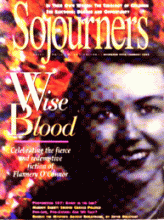All criticism is autobiography, one of the literary gurus said. So to declare the hidden agenda right up front, I am a Southerner, from the deepest Deep South. There I enjoyed the blessings and trials of a Southern Baptist raising, and later chose to become a Roman Catholic. So it should be no surprise when I tell you that Miss Mary Flannery O'Connor speaks to my condition.
"The two circumstances that have given character to my own writing have been those of being Southern and being Catholic," O'Connor wrote in an essay titled, "The Catholic Novelist in the Protestant South."
"What the Southern Catholic writer is apt to find, when he [sic] descends within his imagination, is not Catholic life but the life of this region in which he is both native and alien." This she suggested was because the South is a culture, while the church, at least in America, is not.
The South's identity, according to O'Connor, results from beliefs and qualities "absorbed from the scriptures and from her own history of defeat and violation: a distrust of the abstract, a sense of human dependence on the grace of God, and a knowledge that evil is not simply a problem to be solved, but a mystery to be endured."
And so it is to this day. In 1989, The Encyclopedia of Southern Culture suggested that the best indicator of the Southern culture's geographic boundaries is the preponderance of TV preachers and gospel music in the electronic airwaves. In October of this year, a public opinion poll showed that the South is still markedly more religious than the rest of the country.
The characteristics of Southernness to which O'Connor pointed are all clearly present in her stories.
Read the Full Article

